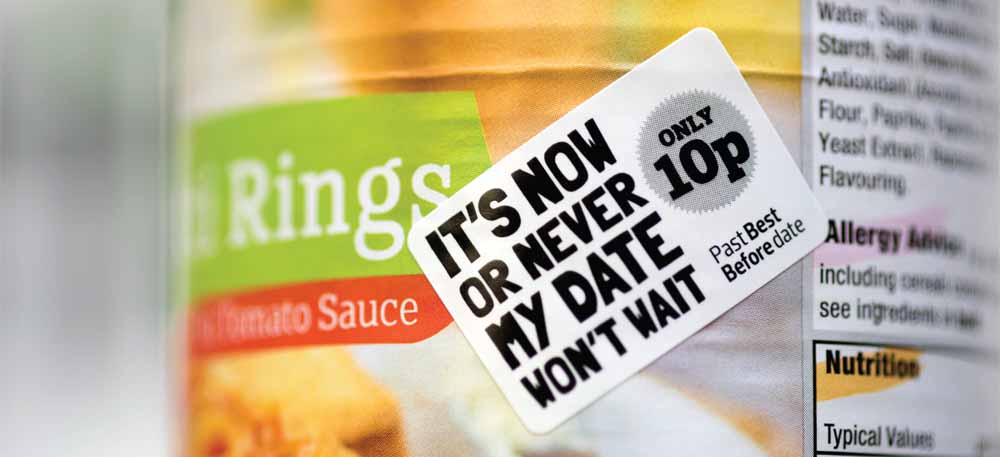
East of England Co-op: Pioneering Food Waste Reduction in 2018
Extending food’s life expectancy
The East of England Co-op has successfully launched an innovative campaign to reduce food waste and plans more exciting development in 2018
The East of England Co-op recently made the headlines in the national media by becoming the UK’s first major retailer to sell products that are past their ‘Best before’ date. Having trialled its ‘Co-op Guide to Dating’ scheme for three months in 14 of its stores, the retailer was pleased to see an overwhelmingly positive response from its customers. Joint Chief Executive Roger Grosvenor shared with us that the results of the trial turned out to be a pleasant surprise, as products put on sale at a symbolic nominal price of 10p were cleared within hours by customers, when it was expected that it would take around a month for them to sell.
‘Best before’ dates are quality dates given by the manufacturer, and they indicate the time frame within which a product is at its best quality. Products that have ‘Best before’ dates usually come in bottles, jars, packets and cans.
Roger was quick to reiterate that many products are perfectly fine to consume even when they have gone beyond their ‘Best before’ date. “Best before only means that the product cannot be guaranteed to be at its peak but is still edible.” Therefore, Roger clarifies, they can legally continue to sell the product after the indicated date.
‘Best before’ dates are not to be confused with the ‘Use by’ dates that are applied to products with a short shelf life, such as milk, meat or fish. Foods with a ‘Use by’ date cannot be sold after their expiration date. The East of England Co-op also announced that in order to comply with the Food Standard Agency guidelines, food being sold past its ‘Best before’ date will remain on sale for up to one month.
The motivation behind the East of England Co-op’s new initiative is plain to see – waste within the food industry has been a matter of concern for some time, with 30 to 50 per cent of food produced globally for human consumption estimated to be wasted.
The East of England Co-op Joint Chief Executive outlined three of the key benefits the ‘Co-op Guide to Dating’ initiative can bring to both the company and the wider environmental picture. “The East of England Co-op will save money for not having to pay for the removal of waste,” Roger commented. In addition to that, although he did not play up the significance of the retail value that can be accumulated from selling products past their ‘Best before’ date, he acknowledged this as another welcome consequence of running the campaign.
“Furthermore,” Roger continues, “the food is being consumed for what it was intended to, rather than deposited to the landfill, has an environmental-friendly effect as it reduces the food miles in the disposal of waste.”
By demonstrating sensitivity to environmental issues, the East of England Co-op builds on the tradition it has established to commit to the continual introduction of green measures to its operations. “In 2008,” Roger reminds us, “we were the first major retailer to stop providing one-trip carrier bags free of charge.” Eight years later, in 2016, East of England Co-op completely removed one-trip carrier bags from across the business, which resulted in the use of re-usable and exchangeable bags only.
The ‘Sourced Locally’ initiative is another example that highlights the East of England Co-op’s willingness to be part of the solution to environmental issues. The campaign, founded in 2007, encourages the sourcing of local production to reduce one’s carbon footprint. The retailer has expressed its satisfaction over the consistently good results the initiative has achieved. The East of England Co-op now works with more than 100 suppliers who stock stores across the region with thousands of different products – from fruits and vegetables, to meats and fish.
Continued improvements
Upon entering 2018, Roger reflected on the past year for the business. “Despite challenging conditions across the retail sector, the East of England Co-op managed to maintain year-on-year growth across its family of businesses,” he stated.
Asked about the latest employee development taking place at the East of England Co-op, Roger was keen to point out that the majority of East of England Co-op’s colleagues have undergone dementia-friendly training so that they can better support customers living with the condition.
So, what about the New Year? Roger emphasised the importance of finishing the refurbishment works still going on in some of the East of England Co-op premises across the Norfolk, Suffolk and Essex areas. It has been a targeted area of development for the company and it has played a central role in its plans for the past couple of years. “Of our 250 retail units, there are 30 remaining to be refitted to complete a challenge we started just over two years ago to have an estate fit for purpose, providing a safe and enjoyable environment for members and customers to shop or access our services,” Roger concluded.